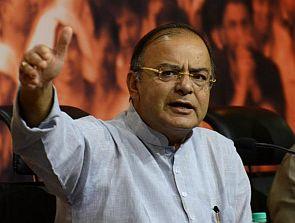 Finance Minister Arun Jaitley on Wednesday accused Congress of setting a wrong precedence for future opposition parties by continuously disrupting Parliament and said decision making in future will have to shift to executive actions and money bills.
Finance Minister Arun Jaitley on Wednesday accused Congress of setting a wrong precedence for future opposition parties by continuously disrupting Parliament and said decision making in future will have to shift to executive actions and money bills.
Irked by Congress disrupting Rajya Sabha for the second session in a row to stall passage of the all-important Constitution Amendment Bill to bring Goods and Services Tax, he said history would not be kind to the "outlaws of Parliamentary" system.
Addressing a gathering of industry leaders on GST, he said with government business being blocked in Rajya Sabha, future decision making "will have to take place through executive action and money bills."
Money bills, which largely concern taxation, government spending or having financial implications, can be introduced only in Lok Sabha. Rajya Sabha cannot make amendments in a Money Bill passed by Lok Sabha and transmitted to it.
Mere approval of Lok Sabha, where the ruling Bharatiya Janata Party has an absolute majority, is enough to push through a legislation that has been certified as money bill by the lower house speaker.
"If by sheer noise and disturbance, session after session of the parliament is not allowed to function then this is a going to be a precedence for Parliament of the future and all opposition for state legislation," Jaitley said.
He said the country is entering into a phase where "legislative activity is going to become increasingly more difficult."
"Those who are responsible for setting this precedence have to realise their role in bringing this unfortunate turning point to Indian democracy will also find a place in history when we look back at the history of India's parliamentary democracy," he said.
"If by these tactics you become outlaws as far as parliamentary democracies are concerned, then you will make a decision making process particularly in relation to legislation extremely difficult and governments in the future will have to realise decisions making have to take place through executive action and through money bill," he said.
"I do realise that executive actions and money bills are more easily implementable than routine legislations," Jaitley said.
He said the impasse over GST is resolvable provided there was an intention to resolve it.
"But if the intention is that India must not be allowed to grow, it had slowed down when I was in power (and) therefore it should slow down when somebody else is in power, if that is the intention then I am afraid we will have to find alternative methods of how to proceed with this," he said.
To get GST, Parliamentary democracy must be allowed to function.
"Even today Rajya Sabha numbers are in favour of GST. In April the figure will be overwhelmingly in favour of GST," he said.
The minister said, "When history will adversely record the role of each one of us, probably when Parliamentary democracy was being paralysed and progressive legislation was not allowed, it won't only record the disrupters it will also record people like us, particularly we the leaders of the House who wish everyday that the House does function."
GST, he said, is an idea that will have to be approved on Thursday if not on Wednesday and "we are just going through the agony prior to the passage of the Bill."
"But I think the real strength of India's democracy is not whether we will be able to pass it. If we introspect the weakness of democracy, the issue where everybody claims to support it and still the country feels helpless of not being able to pass it and therefore, more the pressure you build, the more those who stop it realise that they have a price to pay for it and probably the faster we will be able to ensure the passage of the Bill," he told the industry leaders.
Observing the India's growth rate could go up by as much as 1 to 2 per cent with reforms and improvement in the global economic situation, Jaitley said "nobody has the right to halt and slowdown the process."
India is the only bright spot recording a "respectable growth" of 7 and 7.5 per cent when the whole world in going through a bad phase, he said, adding "out potential is significantly more than what we are achieving."
"India has right to grow much faster, India has right to achieve full potential, and nobody in India has right to slowdown the process of growth," he said.
Jaitley said most countries in the world are facing challenges and some of them are impacting India as well.
"We are impacted by the weakness of the export market substantially. We are also impacted because global demands are slow. Domestically we are impacted by the fact (that) we had two consecutive years of less than normal monsoon," he said.
Despite adversities, India's real potential is significantly more that what it has achieved.










